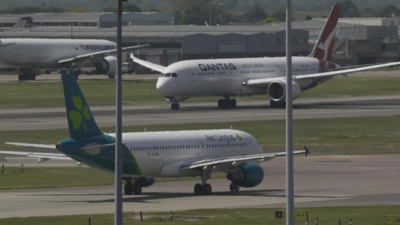China Accuses US of Whining Over Trade Disputes Amid Ongoing Tensions

In a bold statement reflecting the increasing tensions in international trade, Chinas official state media has asserted that the United States should stop whining about its perceived victimization in the ongoing trade war. This comes in the context of a protracted conflict between the two largest economies in the world, which has shown no signs of abating.
Last week, both countries implemented tit-for-tat tariff hikes, although recent developments suggest a temporary pause in these escalations. However, the underlying friction continues to simmer, with declarations from both sides that indicate a deepening rift.
On Tuesday evening, China Daily, the English-language mouthpiece of the ruling Chinese Communist Party (CCP), published a scathing editorial. It criticized President Donald Trumps frequent claims that the US is being ripped off in trade deals, calling such assertions hoodwinking the US public. The article posited that the real issue at hand is not exploitation by other nations but rather the US's own economic practices.
According to the editorial, The US is not getting ripped off by anybody. The problem is the US has been living beyond its means for decades. It consumes more than it produces. It has outsourced its manufacturing and borrowed money in order to have a higher standard of living than its entitled to based on its productivity. Rather than being cheated, the US has been taking a free ride on the globalization train. This sentiment underscores a growing frustration in Beijing, where officials believe the US is deflecting blame onto external actors while ignoring its internal economic challenges.
The CCP has remained steadfast in its refusal to comply with Trumps demands for a renegotiation of trade terms. In response to the ongoing standoff, White House spokesperson Karoline Leavitt conveyed a message from Trump stating, the ball is in Chinas court. This position emphasizes that the US is not under pressure to reach an agreement, suggesting a significant power dynamic in these negotiations. Trump further commented, China needs to make a deal with us. We dont have to make a deal with them. Theres no difference between China and any other country except they are much larger.
The implications of this trade war are vast, with analysts predicting significant ramifications for both economies. China, in particular, has been grappling with challenges in recovering from the pandemic, evidenced by low consumer spending and alarmingly high youth unemployment rates.
In a twist of irony, on Wednesday, China announced economic growth figures that exceeded expectations, reporting a 5.4% increase in the first quarter of the year. This growth was attributed to a surge in exports, as businesses rushed to ship products to the US before the latest tariffs took effect. Despite the optimistic figures, Sheng Laiyun, a senior official at Chinas National Bureau of Statistics, cautioned that the US tariffs would inevitably exert pressure on Chinas foreign trade and broader economic landscape.
As the trade war escalates, Chinese leader Xi Jinping has embarked on a diplomatic trip across several Asian nations. Notably, this journey was planned prior to the tariff conflict but serves to bolster Chinas efforts to strengthen trade relationships in the region. In a statement released ahead of his visit to Malaysia, Xi expressed Chinas willingness to collaborate with Malaysia and other ASEAN nations. He emphasized the importance of fostering peace and cooperation amidst the geopolitical tensions, stating, China would be willing to partner with Malaysia and other ASEAN countries, following the trend of peace and the development of history, fend off the undercurrent of geopolitics and tribalism, break the unilateralism and protectionism, and create high-level strategic alliances between China and Malaysia that lead to a close community of common destiny.
While the tariff rates currently stand at a staggering 145% on Chinese imports to the US and 125% on US goods entering China, both governments are exploring alternative measures to escalate their positions. Reports indicate that China has instructed its airlines to halt purchases of various aircraft-related equipment and parts from American manufacturers, including Boeing. Additionally, there are discussions about potential assistance for airlines that lease Boeing aircraft, which now face increased costs due to the tariffs.
In a noteworthy development, around 10 Boeing 737 Max jets are being prepared for Chinese airlines. Some of these jets may still enter China, provided that the necessary delivery paperwork and payment processes were completed prior to the implementation of the tariffs.
On another front, the Hong Kong postal service has announced it will cease accepting packages bound for the US. A statement from Hong Kong Post warned that sending items to the US would require customers to pay exorbitant fees due to the unreasonable and bullying acts of the US government. It was clarified that items containing only documents, without any goods, would not be impacted by this decision. Notably, while Hong Kong is subject to the same tariffs as mainland China, it has not independently imposed any retaliatory tariffs.
Meanwhile, President Trump has signaled an intention to investigate further tariffs on pharmaceuticals and semiconductors, which would influence a broad range of the USs trade partners. He has also ordered a probe that could lead to tariffs on critical minerals, rare-earth metals, and associated products such as smartphones. China, which plays a dominant role in global supply chains for these rare metals, has already implemented export controls on several key rare earth elements since the trade conflict began.
As the situation develops, it remains clear that the trade war will continue to challenge both countries, with significant implications for the global economy.



























